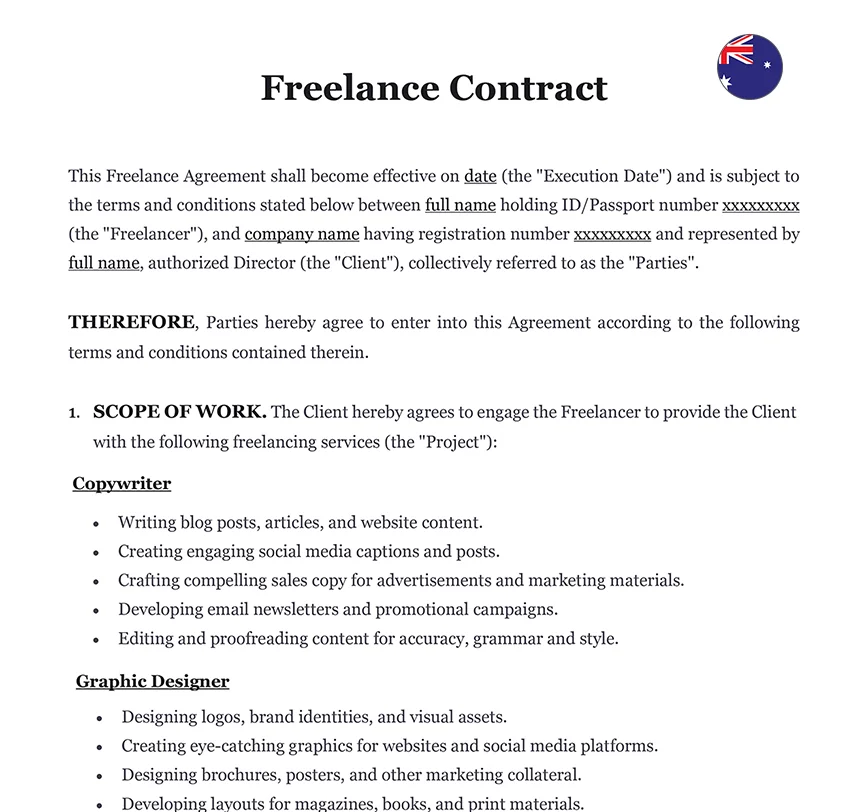What is important when hiring a freelancer
When you hire a freelancer, one of the most important documents you’ll need is a Freelance Contract. This contract not only defines the scope of the work but also establishes the terms and conditions under which the freelancer will operate. Without a well-drafted Freelance Contract, you risk potential misunderstandings, disputes, and even legal consequences. Ensuring that both parties are clear about their rights and obligations is essential to a successful working relationship.
Incorporating a Freelance Contract helps to formalize the arrangement, setting expectations for both parties. It serves as a reference point throughout the project, providing clarity on deliverables, deadlines, payment terms, and other critical aspects. This contract acts as a safeguard, protecting your interests and those of the freelancer, and ensuring that the project runs smoothly from start to finish.
For businesses that regularly engage in contractual agreements, it’s also crucial to understand the nuances of Structuring Your Company with Investor Agreements, which can similarly protect your business relationships and investments.
Defining the Scope of Work
The scope of work is a fundamental part of any Freelance Contract. It outlines exactly what the freelancer is expected to deliver, including the specific tasks, milestones, and timelines.
1. Detailed Descriptions: The contract should include a detailed description of the services the freelancer will provide. This includes the nature of the work, the expected deliverables, and any milestones that need to be achieved.
2. Timelines and Deadlines: Clearly defining deadlines is crucial. The contract should specify when each phase of the work is expected to be completed, as well as the final deadline for the project.
3. Revisions and Modifications: The contract should also address how revisions will be handled. This includes the number of revisions allowed and any additional costs associated with changes to the scope of work.
For those interested in understanding how contracts can protect both parties in various professional scenarios, our article on Important Clauses for Independent Consultant Contracts offers valuable insights.
Payment Terms and Conditions
Another critical component of a Freelance Contract is the payment terms. These terms outline how and when the freelancer will be paid for their services.
1. Payment Structure: The contract should specify the payment structure, whether it’s an hourly rate, a flat fee, or payment based on milestones. This helps avoid confusion and ensures that both parties are on the same page.
2. Payment Schedule: It’s important to establish a clear payment schedule. This could be upon completion of certain milestones, on a monthly basis, or after the entire project is completed. Late payment penalties should also be defined.
3. Expenses and Reimbursements: If the freelancer incurs expenses during the project, the contract should outline whether these will be reimbursed and under what conditions. This includes travel, materials, or any other out-of-pocket costs.
To understand how to navigate payment and financial clauses, our article on Drafting Personal Loan Agreements: Key Points to Consider provides a thorough overview of similar financial considerations.
Intellectual Property Rights
Intellectual property (IP) is often a major consideration when hiring freelancers, especially in creative industries.
1. Ownership of Work: The contract should clearly state who owns the rights to the work created. Typically, the client retains ownership of all work produced under the contract, but this must be explicitly stated.
2. Licensing and Usage: If the freelancer retains any rights to the work, the contract should outline the licensing terms, including how the work can be used by both parties. This could include limitations on distribution, modifications, or commercial use.
3. Confidentiality Agreements: To protect sensitive information, a confidentiality clause should be included in the contract. This prevents the freelancer from disclosing proprietary information during or after the project.
For those dealing with sensitive business information, it’s crucial to consider Using NDAs to Safeguard Business Secrets in Australia, which discusses the importance of non-disclosure agreements in protecting intellectual property.
Legal Compliance and Tax Considerations
Hiring freelancers in Australia involves adhering to specific legal and tax obligations.
| ➤ Classification of Workers: It’s important to correctly classify the freelancer as an independent contractor rather than an employee. Misclassification can lead to legal and financial penalties. |
| ➤ Tax Obligations: Freelancers are responsible for their own taxes, but the contract should specify that the freelancer will handle their own tax obligations. This includes GST if the freelancer is registered for it. |
| ➤ Superannuation and Benefits: Unlike employees, freelancers are not entitled to superannuation or other employment benefits. The contract should clearly state that these are not provided. |











